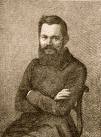Heinrich Laube 1806 - 1884
December 12, 2008
 Heinrich
Laube 1806 - 1884 was a
German dramatist, novelist and theatre director and an advocate of
homeopathy.
Heinrich
Laube 1806 - 1884 was a
German dramatist, novelist and theatre director and an advocate of
homeopathy.
Heinrich Laube was a friend of Bettina von Arnim, Heinrich Heine,
Laube was a friend of Heinrich Heine, to whom he sent a letter via a homeopath. (?possibly his friend Friedrich Jakob Rummel).
Laube was also a friend of Bettina von Arnim:
Similar to the way Bettina von Arnim tried to bridge gaps in opinion within her salon, she herself was often cast in the role of a link between the older generation of German Romantics and a new generation of writers known as Young Germany (Junges Deutschland).
According to Wilhelmy, although the Young Germans were generally too subversive and politically oriented to be a regular part of Berlin’s cosmopolitan salon society, they did influence the literary landscape in German regions, and many found a comfortable haunt in Bettina von Arnim’s parlor (163-66).
The exchange of ideas between Bettina von Arnim and the Young Germans contributed to their shared theoretical views on the function of literature in society, which directly precipitated Bettina von Arnim’s attempts to influence politics through literature.
The Young Germans included the journalists and publishers Ludolf Wienbarg, Karl Gutzkow, Gustav Kuhne and Heinrich Laube, as well as author and publisher Theodor Mundt, and, serving as one of the groups theoretical leaders, Ludwig Borne. Also associated with this circle via the collective ban on their writings in 1835, were famous poet and journalist Heinrich Heine, and the brilliant young playwright and essayist Georg Buchner.
The prohibition of their works throughout German regions served to unite them in the eyes of the reading public, even if they themselves were not always united in opinion, or, as in the cases of Heinrich Heine and Buchner, chose not to formally associate themselves with the group.
But regardless of their stances on self identification, after the publication of Bettina von Arnim’s Goethebuch, these liberal and outspoken thinkers saw in Bettina von Arnim a link between past and present who helped them to both identify with, and separate from, their historical literary influences.
Heinrich Laube born at Sprottau in Prussian Silesia. He studied theology at Halle and Breslau (1826-1829), and settled in Leipzig in 1832. Here he at once came into prominence with his political essays, collected under the title Das neue Jahrhundert, in two parts—_Polen_ (1833) and Politische Briefe (1833)—and with the novel Das junge Europa, in three parts—_Die Poeten_, Die Krieger, Die Bürger—(1833-1837).
These writings, in which, after the fashion of Heinrich Heine and Ludwig Borne, he severely criticized the political regime in Germany, together with the part he played in the literary movement known as Das junge Deutschland, led to his being subjected to police surveillance and his works confiscated.
On his return, in 1834, from a journey to Italy, undertaken in the company of Karl Gutzkow, Laube was expelled from Saxony and imprisoned for nine months in Berlin. In 1836 he married the widow of Professor Hanel of Leipzig; almost immediately afterwards he suffered a year’s imprisonment for his revolutionary sympathies.
In 1839 he again settled in Leipzig and began a literary activity as a playwright. Chief among his earlier productions are the tragedies Monaldeschi (1845) and Struensee (1847); the comedies Rokoko, oder die alien Herren (1846); Gottsched and Gellert (1847); and Die Karlsschuler (1847), of which the youthful Johann Christoph Friedrich von Schiller is the hero.
In 1848 Laube was elected to the Frankfurt Parliament for the district of Elbogen, but resigned in the spring of 1849, when he was appointed artistic director of the Hofburg theatre in Vienna. This office he held until 1867, and in this period fall his finest dramatic productions, notably the tragedies Graf Essex (1856) and Montrose (1859), and his historical romance Der deutsche Krieg (1865-1866, 9 vols), which graphically pictures a period in the Thirty Years’ War.
In 1869 he became director of the Leipzig Stadttheater, but returned to Vienna in 1870, where in 1872 he was placed at the head of the new Stadttheater; with the exception of a short interval he managed this theatre with brilliant success until his retirement from public life in 1880.
He has left a valuable record of his work in Vienna and Leipzig in the three volumes Das Burgtheater (1868), Das norddeutsche Theater (1872) and Das Wiener Stadttheater (1875).
His pen was still active after his retirement, and in the five years preceding his death, which took place at Vienna on the 1st of August 1884, he wrote the romances and novels Die Bohminger (1880), Louison (1881), Der Schatten-Wilhelm (1883), and published an interesting volume of reminiscences, Erinnerungen, 1841-1881 (1882).
Laube’s dramas are not remarkable for originality or for poetical beauty; their real and great merit lies in their stage craft. As a theatre manager he has had no equal in Germany, and his services in this capacity have assured him a more lasting name in German literary history than his writings.
His Gesammelte Schriften (excluding his dramas) were published in 16 vols (1875-1882); his Dramatische Werke, in 13 vols (1845-1875); a popular edition of the latter in 12 vols (1880-1892). An edition of Laube’s Ausgewahlte Werke in 10 vols appeared in 1906 with an introduction by H. H. Houben.